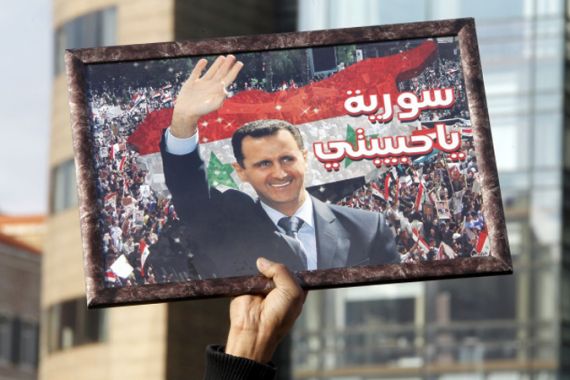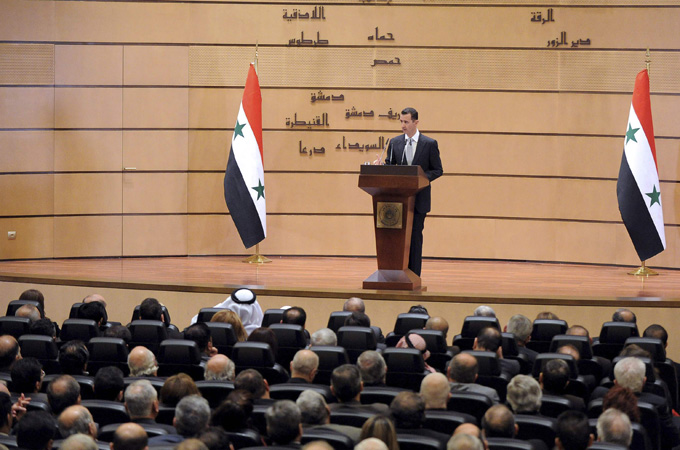Assad’s reform pledges in Syria’s uprising
With the date for constitution referendum set, Al Jazeera looks back at the decrees passed since protests erupted.

 |
| The constitution, if passed, would restrict the president to serving a maximum of two terms of seven years [Reuters] |
Syria’s state-run news agency said that President Bashar al-Assad has set February 26 as the date for a national referendum on the country’s new draft constitution.
Parliamentary elections will be held within 90 days of the approval of the constitution, state television reported on Wednesday.
If passed, it would restrict the president to serving a maximum of two terms of seven years and introduce a pluralistic party system.
But with cities such as Homs in open revolt, critics say holding an inclusive referendum will be impossible.
Al Jazeera’s Rula Amin, reporting from Beirut in neighbouring Lebanon, said opposition figures inside Syria told her they did not want to take part in the referendum since they were not involved in drafting the draft.
“They say that if the president is serious about reform, they should have been allowed to take part in the process of drafting the constitution,” our correspondent said.
“Still, this draft constitution is a major step if you look back in Syrian history. For the first time, the president of Syria from now on will be elected – not appointed by referendum – and there will have to be at least two candidates for the presidency”.
Al Jazeera looks back at some of the reform initiatives passed since anti-government protests erupted across the country in March 2011.
| Reaching out to conservatives |
The first move by Assad in response to protests came on April 6 when Syria’s embattled leadership scrapped a ruling that banned teachers from wearing the niqab – a veil that hides a woman’s face other than her eyes – in a move seen as an attempt to reach out to conservatives.
Assad had banned the niqab from the classroom in July 2010, forcing hundreds of women from teaching roles into administrative positions. The move was ostensibly part of a campaign to mute sectarian differences, but angered many conservatives.
In a further concession, Assad ordered the shutting down of Casino Damascus. The state-owned paper Tishreen said the club’s owners “violated laws and regulations”, without adding details.
| Kurds |
On April 7, Assad issued a decree granting nationality to thousands of Kurds living in the eastern al-Hassake region. The decision affects at least 150,000 Kurds registered as foreigners as a result of a 1962 census in the region.
| Ending state of emergency |
On April 22, Assad issued decrees ending nearly five decades of emergency rule. The emergency law was established in 1963 when the Baath party seized power. It prohibited several civil liberties, such as public gatherings, and authorised the arrest of any individual thought to pose a security threat.
| Abolishing state security courts |
Also on April 22, Assad issued a decree abolishing state security courts. These courts operated independently from the conventional judicial system and were used to prosecute people accused of challenging the government. The verdicts reached in these courts could not be appealed.
| Amnesty |
On May 31, Assad issued a decree granting a general amnesty that state media said would cover all political movements, including the outlawed Muslim Brotherhood.
On June 20, Assad issued a decree granting general amnesty for “crimes” committed before that date. A similar decree was issued in January 2012.
| Local elections law |
On August 4, Assad issued the local administration law which gives the local administrations more powers and financial independence.
An official in Damascus told Al Jazeera that “the new law is based on international standards. The electoral process is – for the first time – being supervised by judicial committees as opposed to the interior ministry, the way it used to be”.
The first local elections since the law was passed took place in December, but the turnout was low as activists called for boycotting the polls.
| Political parties law |
On August 4, Assad issued a decree authorising a multi-party political system in Syria.
The decree stipulates that a party cannot be founded on a “religious, tribal, regional, denominational, or profession-related basis” or be a “branch of or affiliated to a non-Syrian party or political organisation”.
Syria has effectively been a one-party state since 1963 and article 8 of the constitution stipulates that the Baath Party is “the leader of state and society”.
| Media law |
On August 28, Assad approved a new media law that purportedly upholds freedom of expression and bans the arrest of journalists.
Commenting on the law, the Committee to Protect Journalists, a global organization, said:
Syrian decree outlines what can be seen as ‘positive” press freedom clauses, such as the lack of a “monopoly on the media” and the “right to access of information about public affairs,” and bans “the arrest, questioning, or searching of journalists.” And yet the legislation contains several anti-press clauses, including barring the media from publishing content that affects “national unity and national security,” incites sectarian strife or “hate crimes,” or harms state symbols. The law also forbids the publication of any information about the armed forces. It holds editors-in-chief, journalists, and even spokespeople accountable for actions that constitute a violation of the law and imposes fines on them of up to one million Syrian pounds (US$21,000).